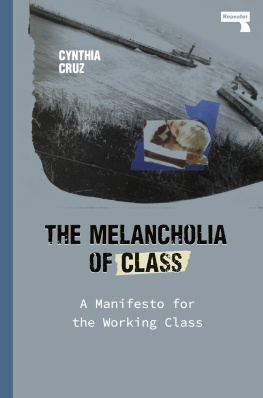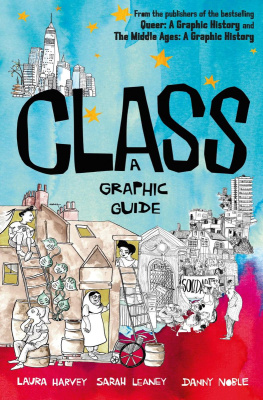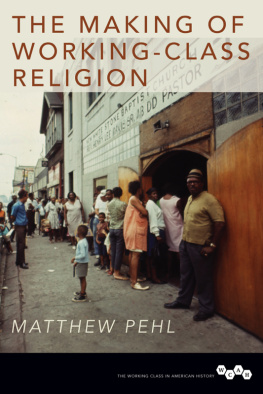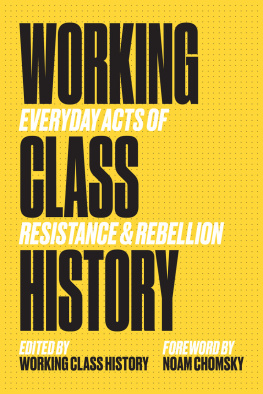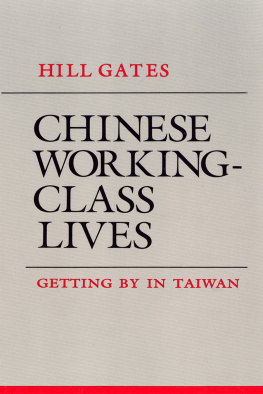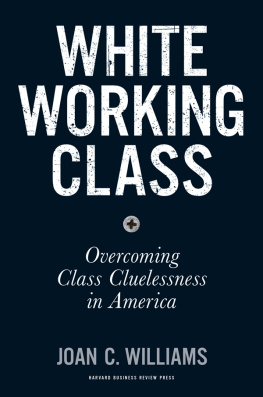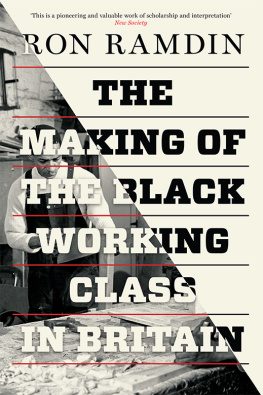Cynthia Cruz - The Melancholia of Class: A Manifesto for the Working Class
Here you can read online Cynthia Cruz - The Melancholia of Class: A Manifesto for the Working Class full text of the book (entire story) in english for free. Download pdf and epub, get meaning, cover and reviews about this ebook. year: 2021, publisher: Penguin Random House LLC (Publisher Services), genre: Religion. Description of the work, (preface) as well as reviews are available. Best literature library LitArk.com created for fans of good reading and offers a wide selection of genres:
Romance novel
Science fiction
Adventure
Detective
Science
History
Home and family
Prose
Art
Politics
Computer
Non-fiction
Religion
Business
Children
Humor
Choose a favorite category and find really read worthwhile books. Enjoy immersion in the world of imagination, feel the emotions of the characters or learn something new for yourself, make an fascinating discovery.
- Book:The Melancholia of Class: A Manifesto for the Working Class
- Author:
- Publisher:Penguin Random House LLC (Publisher Services)
- Genre:
- Year:2021
- Rating:4 / 5
- Favourites:Add to favourites
- Your mark:
- 80
- 1
- 2
- 3
- 4
- 5
The Melancholia of Class: A Manifesto for the Working Class: summary, description and annotation
We offer to read an annotation, description, summary or preface (depends on what the author of the book "The Melancholia of Class: A Manifesto for the Working Class" wrote himself). If you haven't found the necessary information about the book — write in the comments, we will try to find it.
The Melancholia of Class: A Manifesto for the Working Class — read online for free the complete book (whole text) full work
Below is the text of the book, divided by pages. System saving the place of the last page read, allows you to conveniently read the book "The Melancholia of Class: A Manifesto for the Working Class" online for free, without having to search again every time where you left off. Put a bookmark, and you can go to the page where you finished reading at any time.
Font size:
Interval:
Bookmark:



Published by Repeater Books
An imprint of Watkins Media Ltd
Unit 11 Shepperton House
89-93 Shepperton Road
London
N1 3DF
United Kingdom
www.repeaterbooks.com
A Repeater Books paperback original 2021
Distributed in the United States by Random House, Inc., New York.
Copyright Cynthia Cruz 2021
Cynthia Cruz asserts the moral right to be identified as the author of this work.
ISBN: 9781912248919
Ebook ISBN: 9781913462277
All rights reserved. No part of this publication may be reproduced, stored in a retrieval system, or transmitted, in any form or by any means, electronic, mechanical, photocopying, recording or otherwise, without the prior permission of the publishers.
This book is sold subject to the condition that it shall not, by way of trade or otherwise, be lent, re-sold, hired out or otherwise circulated without the publishers prior consent in any form of binding or cover other than that in which it is published and without a similar condition including this condition being imposed on the subsequent purchaser.
Printed and bound in the United Kingdom by TJ Books Ltd

Cynthia Cruz knows all the traps, dead ends, and false victories waiting for working-class kids trying to become someone in the eyes of the monied world. In her deft portraits of artists like Paul Weller and Barbara Loden, she not only defines invisible barriers and gives voice to unspoken forms of despair, but also offers avenues of escape. This is a vital book, deeply personal and charged with the kind of wisdom and solidarity that only belongs to those who understand what it feels like to be overlooked and left behind.
J IM G AVIN , CREATOR OF L ODGE 49
An unprecedented reckoning with class and poverty as it relates to creative life in the modern age. Cruz shines a clear-eyed and evincing light on what often elides description in literary arts: the economic and social cost of life under and through the written word. Through capacious, erudite, and ultimately compassionate interrogation of capitalisms steady and pervasive chiasma on literary culture and beyond, Cruz forges a merciful new footing to state whats long overdue: that many of us have been dying while we write, and that the sorrow of surviving poverty, if at all, is a grief finally named in this courageous and deeply true work.
O CEAN V UONG , AUTHOR OF O N E ARTH W ERE B RIEFLY G ORGEOUS
I want to rehabilitate this period by writing of it with the name of things most noble. My victory is verbal and I owe it to the richness of the terms, but may the poverty that counsels such choices be blessed.
Jean Genet
CONTENTS
INTRODUCTION
The first tremors of awakening serve to deepen sleep.
Walter Benjamin, The Arcades Project
I recently met with a former mentor and professor of mine. I explained this book and its concept to her: the melancholia that ensues when one abandons ones working-class background. After I had explained it and how it came about, she told me, reassuringly, that I dont dress or talk like someone from the working class. I was stunned by her comment. What, I wondered, did she imagine someone from the working class might look or talk like? I was shocked, and yet friends and colleagues say things like this to me often.
I didnt ask my mentor what she imagined the working class look or talk like. I was too shocked to react in any coherent way. But also, I already had a pretty good idea. The images my mentor was calling to mind when she imagined me as not looking or talking like someone from the working class are the same ones friends and colleagues call to mind when they too imagine the working class.
When, for instance, I was on food stamps, when for much of my adult life my earnings have situated me comfortably within the US parameters for poverty, what did I look like? I was teaching undergraduate and graduate students; I was writing books. In other words, I appeared the way I always appear.
Being poor or working-class is not a look. The specter of what the middle class imagine as working class is always with me. In a sense, this specter is my double, my working-class self, the ghost of who I left behind when I left my home town, now hidden behind a palimpsest of tropes the middle class invented (throughout this book I use the terms middle class, bourgeoisie and ruling class interchangeably). It is where I come from, who I am and who I will always be.
Of course, even when Ive lived in poverty, Ive been able to present myself: comb my hair, wear clean, contemporary clothing. And is this not the case for all working-class people? When the middle class say I dont look or sound working-class, what is really being alluded to is the unsayable how the working-class subject appears in the dreams of the middle class: a monstrosity, unclean, disheveled, haunting. Such tropes are consistent theyve been around for decades and are culturally constructed and reinforced by the media. And yet, of course, such tropes contradict reality.
The growing majority of working-class people in the United States are women and non-white. Here in New York City, for example, where I live, the majority of construction workers, nannies, taxi drivers, shop clerks, bus drivers, transit workers, and food deliverers are not white. At the public university where I teach, my students are working-class and almost entirely non-white. The liberal middle classs continued adherence to this set of old stereotypes serves to erase the working class in two ways. First, by insisting that there is no working class because there are seemingly no white, male factory workers anymore, whilst, at the same time, removing social class from the experience of the non-white working class. Furthermore, these stereotypes set up a false binary between white and non-white workers when, in fact, all members of the working class share in the same struggle against oppression by the ruling class. With the removal of the term social class from discourse, this elementary fact is erased.
And yet it wasnt always this way. As Boris Groys points out, before the 1980s there was a shift from what he calls horizontal solidarity to vertical solidarity. As he writes:
The notion of solidarity is historically connected to the struggle of the exploited classes against the exploiting classes. Thus, in the context of the class struggle solidarity was always horizontal solidarity. This was a solidarity among the oppressed, directed against the oppressors.
In the 1980s, parallel with the emergence of neoliberalism (throughout this book I use neoliberalism and capitalism interchangeably), this new vertical solidarity began to emerge. As Groys writes, Thus it is that we will often read that all American women should manifest their solidarity with Hillary Clinton because shes a woman. All women, regardless of social class, were expected to take on the same desire to move up the ladder. These ideologies are never spoken, they dont have to be all true ideologies are normalized, permeating through all aspects of culture.
This slow erasure of social class and class difference and insistence on meritocracy has changed our society. At the same time, although social class has been removed from discourse, old, culturally-constructed stereotypes of the working class continue, keeping the working class in our place. When my mentor told me that I didnt look working-class, I was rendered speechless. One moment I was having a conversation with an activist about the state of the world. The next moment I was shocked back into reality. Amnesia is a constant sea. We swim in it all the time. We need the ballast of memory, as the filmmaker John Akomfrah says. I was asleep in the belief that I was just like my mentor, that my mentor imagined me as equal. I fall asleep, I wake up, I play the charade, I fall asleep again. Then I am awakened once again when I am forced to encounter what Lacan calls the Real, that which is in excess of what my psyche can handle. Amnesia, forgetfulness, and dissociation are ways the psyche protects itself from the Real, from the original trauma. When, for example, the reality of who I am and where I come from is projected back onto me and I am removed from the role I am in that moment inhabiting (college professor, writer, academic, etc.). These occurrences happen all the time, and yet each time they occur, I am shocked again.
Next pageFont size:
Interval:
Bookmark:
Similar books «The Melancholia of Class: A Manifesto for the Working Class»
Look at similar books to The Melancholia of Class: A Manifesto for the Working Class. We have selected literature similar in name and meaning in the hope of providing readers with more options to find new, interesting, not yet read works.
Discussion, reviews of the book The Melancholia of Class: A Manifesto for the Working Class and just readers' own opinions. Leave your comments, write what you think about the work, its meaning or the main characters. Specify what exactly you liked and what you didn't like, and why you think so.

